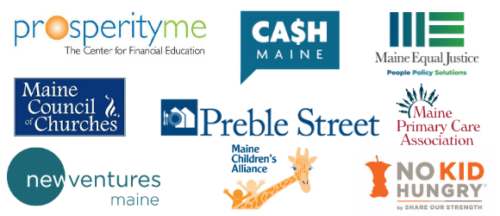Advocates seek to reach thousands of Maine families who have unclaimed tax credit payments for kids
Written by New Ventures Maine | Published on October 15, 2021
With the next advance Child Tax Credit (CTC) payment due to families on October 15th, advocates across the state are leaving no stone unturned to make sure all Maine kids get the tax credits they deserve. Virtually all Maine families qualify for the credit, but households that don’t typically file taxes may not know this extra income is for them.
Personalized help is available through local organizations:
● Capital Area CA$H: (207) 621-3430
● Wabanaki CA$H: (207) 866-6546
● Western Maine CA$H: (207) 778-7954
● Non-English speakers can call ProsperityME: (207) 797-7890
These same navigators will help to determine eligibility and help families to sign up to receive CTC payments at GetCTC.org/MEJ. Families can use this portal until November 15, 2021. Families can still claim the credit after November 15 when they file taxes and receive the credit in their tax refund. For information about free tax preparation, visit cashmaine.org or call 211.
Millions of American families are eligible for the advance credits. Through the American Rescue Plan, eligibility for the tax credit has expanded and almost all families qualify for up to $300 per child per month. Anyone who has a child with a Social Security number can get the credit, even if they don’t have one themselves. It is not necessary to be a tax filer to claim the credit.
Advocates from teachers to medical professionals to tax advocates and economic justice groups—many of them members of a newly formed Credit to Kids Collaborative–are reaching out to communities across Maine to help families claim the credit.
“Our CA$H Navigators are ready to help anyone in the state of Maine to get the Child Tax Credit,” said New Ventures Maine Statewide Asset Manager and CA$H Maine Program Manager Janet Smith. “We want the credit to make as much of a positive impact on families and children as possible, especially when big purchases such as home heating fuel and snow tires are coming up,” she said.
Humam Shawqi, a father and student from Bangor said, “The monthly Child Tax Credit started just at the right time when this money would be most useful to pay expenses, like school clothes for my daughters, car repairs and an inspection sticker, and cash to put food on the table at the end of the month. Things will be easier for us to get through school. We should make certain every family in Maine gets this help.”
For Mainers who speak English as a second language or are immigrants, navigating the tax system to obtain the credit can be challenging. Parents who are immigrants whose children have Social Security Numbers can claim credits, but may need to obtain Individual Taxpayer Identification Numbers (ITINs).“Immigrant families who are less familiar with the U.S. tax system have a harder time understanding what they are eligible for,” added Claude Rwaganje, Executive Director of ProsperityME. “ProsperityME is invested in making sure that eligible immigrant families receive the information they need to apply for the monthly Child Income Tax Credit, a much needed relief to lessen the financial burden many of us have been experiencing.”
Money from the credit has already gone a long way to ensure that the country’s children have enough food. Recent census data show that the number of families reporting that their household didn’t have enough to eat fell by 3.3 million (nearly one-third) in the six weeks after the federal government began issuing monthly payments of the expanded Child Tax Credit. Adults without children (who don’t receive the credit) saw little change over this period.In addition, families with low incomes were particularly likely to spend the monthly payment on necessities: food, utilities, clothing, and rent (although many families also qualify for rental assistance, and should apply again if they have been turned down). Households with incomes above $25,000 also used the credit on necessities and were using the credit to pay down debt or save the funds for emergency and future expenses.
